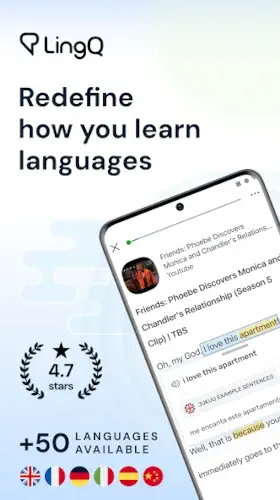Most language apps teach through made up sentences. LingQ takes the opposite approach, it helps you learn using real books, shows, podcasts, and articles in your target language.

With 1 million downloads, a 4.8 star rating (85,000+ reviews), LingQ it’s built for learners who want to move beyond textbook phrases.
Why LingQ Feels Different
Three things set it apart from typical language apps:
-
Real Content From Day One
Whether you’re learning Spanish through telenovela transcripts or Japanese via manga, LingQ lets you study actual material instead of artificial exercises. -
The Color-Coded Vocabulary System
-
Blue words: Ones you’ve marked as known
-
Yellow words: Currently learning
-
White words: New/unfamiliar
This visual system shows progress tangibly, watching a page shift from white to blue over time is oddly satisfying.
-
-
Your Interests Drive Learning
Import anything with text:-
YouTube videos (auto-generates transcripts)
-
Kindle books
-
News articles
-
Even PDFs
-
LingQ Features :
The Content Library: 10,000+ Hours Across 50 Languages
From beginner dialogues to advanced political debates, the built-in library covers:
-
Practical: Travel phrases, business vocab
-
Cultural: Folktales, song lyrics
-
News/Media: Articles, interview transcripts
The Import Tool: Your Media as Lessons
Here’s how to turn a YouTube cooking video into a Portuguese lesson:
-
Paste the URL into LingQ
-
AI generates a transcript
-
Study vocabulary directly from the video’s text
-
Listen repeatedly while reading
Keyword-rich tip: Search “best podcasts to import to LingQ for French learners”
Spaced Repetition That Adapts
Unlike rigid flashcard apps, LingQ’s SRS:
-
Prioritizes words you’ve recently encountered in context
-
Adjusts intervals based on your accuracy
-
Works passively (reviews pop up during reading)
Progress Tracking That Means Something
Beyond simple streaks, you see:
-
Words learned per week/month
-
Listening/reading time breakdowns
-
Vocabulary growth graphs
What Users Say :
The Praise
-
“I went from stumbling through children’s books to reading news articles in 6 months” (Common progress report)
-
“Finally understand my favorite K-pop lyrics without translations” (Entertainment focused learners)
The Complaints
-
“New color scheme makes known/unknown words harder to distinguish” (Recent UI critique)
-
“Managing Chinese characters feels clunky” (Script heavy language issue)
Comparative Option
For structured grammar lessons, LingoDeer complements LingQ well, but lacks the authentic content library.
Who Gets the Most From LingQ?
You’ll Love It If You:
-
Prefer learning through movies/books over textbooks
-
Want to focus on comprehension first
-
Like seeing concrete vocabulary progress
You Might Prefer Alternatives If:
-
You’re an absolute beginner (start with Duolingo)
-
Speaking practice is your priority (try Talkpal)
Age Note:
While rated for all ages, the self directed approach works best for 16+ learners.
LingQ vs. The Competition: Which Language App Actually Works For You?
Choosing a language app isn’t about finding the “best” one – it’s about finding the right fit for how you learn. Here’s how LingQ compares where it matters:
Content Approach Showdown
-
LingQ: Real articles, books, and videos with vocabulary tracking
-
Duolingo: Game like exercises with made up sentences
-
Busuu: Structured lessons with grammar explanations
The Comprehension Sweet Spot
LingQ works best when you understand about 70% of the material already. Compare this to:
-
Duolingo’s 100% comprehensible (but artificial) content
-
Busuu’s 80-90% comprehension level in later lessons
Time Investment
-
LingQ: 15-30 min/day yields noticeable progress in 3 months
-
Duolingo: Needs 45+ min/day for similar results
-
Busuu: Most effective with 20-40 min structured study
![]()
Pro Techniques From Seasoned LingQ Users
Turning YouTube Into Your Personal Tutor
Here’s exactly how to study with YouTube videos:
-
Find a video with closed captions (CC) in your target language
-
Copy the URL into LingQ’s import tool
-
Let AI generate a transcript (takes 2-5 minutes)
-
Study the text:
-
Click unknown words for instant definitions
-
Save important vocabulary
-
-
Listen while reading 3-5 times
-
Listen without text (comprehension check)
Best YouTube Channels to Import
-
For French: “InnerFrench” (clear intermediate content)
-
For Japanese: “Comprehensible Japanese”
-
For Spanish: “Dreaming Spanish”
The 70% Comprehension Rule
If you’re missing more than 30% of words:
-
Find simpler content
-
Use LingQ’s “simplify” AI tool
-
Supplement with a beginner app like LingoDeer
Karaoke Mode For Accent Training
Turn on the setting that highlights words as they’re spoken to:
-
Improve listening comprehension
-
Catch natural pronunciation
-
Notice word connections in fast speech
Writing Corrections Hack
Submit short journal entries (50-100 words) about:
-
Your imported YouTube videos
-
Current events from LingQ news articles
This connects vocabulary to personal expression
Conclusion :
Where LingQ Shines
-
Vocabulary growth: You’ll recognize words in real contexts
-
Content freedom: Study exactly what interests you
-
Passive learning: Background listening counts as study time
Where It Falls Short
-
Speaking practice: Minimal interactive speaking
-
Absolute beginners: Need foundation first
-
Script management: Cumbersome for Chinese/Japanese
LingQ won’t make you fluent alone – but combined with 1-2 conversation sessions weekly, it’s incredibly effective.
FAQ
Where can I download LingQ?
Get LingQ from Google Play Store or visit LingQ.com. For support, email androidsupport[at]lingq.com.
What are some LingQ advanced techniques?
Try “layered reading” – first pass for gist, second for vocabulary, third for grammar patterns.
How do I maintain a long streak?
Set daily minimums (even 10 minutes counts) and use the “Challenge Yourself” feature. Weekends are when most streaks break.
Can I really learn from TV shows?
Yes. Import Friends episodes to study natural conversations. Start with short clips before full episodes.
Is the premium version worth it?
If you study 4+ hours weekly, the vocabulary tracking and content imports justify the cost. Try free first.
